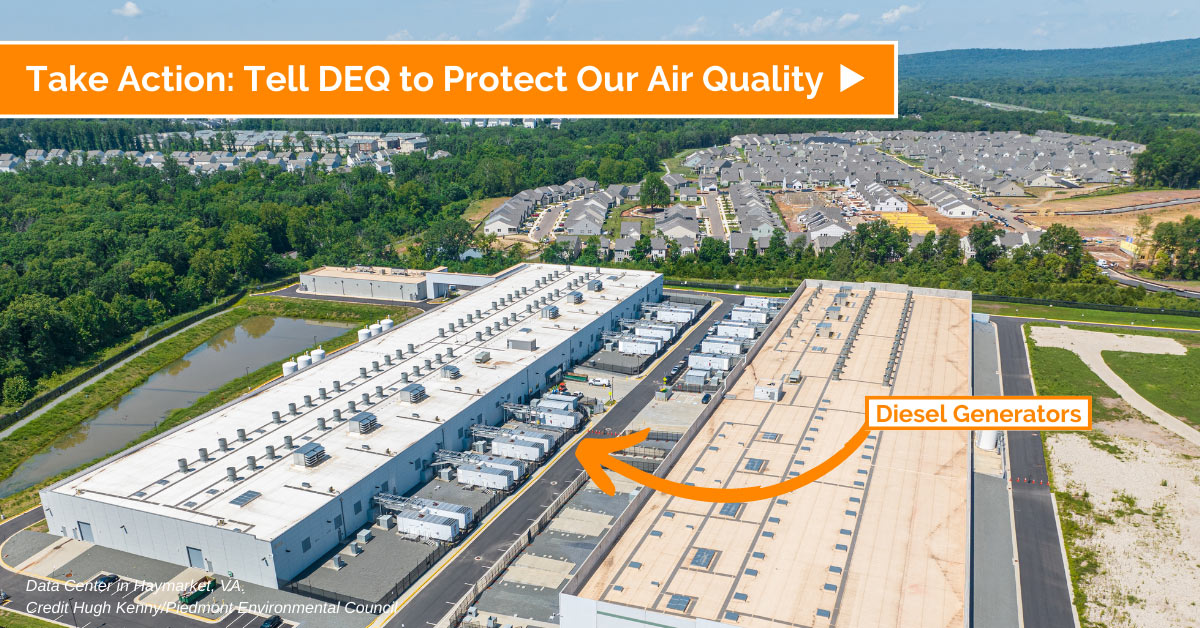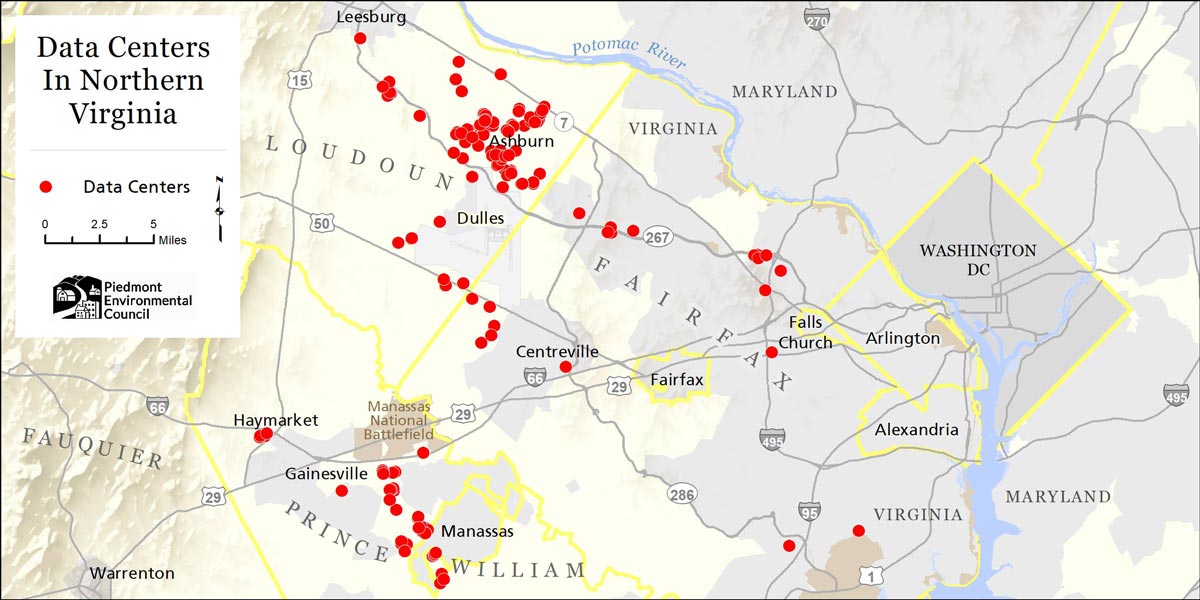Air quality, public health at risk from data center diesel generators
This text was taken from an email sent out on February 24, 2023. Sign up for email alerts →

Dear supporter,
I am writing to you today about a proposed state order that will set a terrible precedent of exempting industry from state laws that protect air quality and public health. Residents in Loudoun, Prince William, Fairfax, and neighboring counties in Northern Virginia, Maryland and the District of Columbia would all be impacted. We urge you to speak out against it at an upcoming public hearing.
The Virginia Department of Environmental Quality (DEQ) is considering adopting a variance that would allow the data center industry to run backup diesel generators for longer and more frequent periods of time from March to July – allowing them to circumvent Virginia’s air pollution control laws that limit dangerous pollutants and emissions.
Diesel exhaust has well-known human health impacts, especially on vulnerable populations like children and the elderly, leading to serious health conditions like asthma and respiratory illnesses and worsening existing heart and lung disease. In addition, these emissions further contribute to greenhouse gas emissions from the dramatic increase of fossil fuels resulting in regional ground-level ozone, acid rain, and global climate change.
To share your concerns, we urge you to attend DEQ’s upcoming public hearing:
Monday, Feb. 27 @ 11 a.m.
Conference Room in Northern Regional Office
13901 Crown Court
Woodbridge, VA
Being that this hearing is scheduled on a Monday at 11 a.m., we know that many will be unable to attend. If that’s you, you can instead submit comments to DEQ before March 14 by emailing Karen G. Sabasteanski, Policy Analyst, directly or by using our form letter.
What’s the big deal?
DEQ’s proposal would allow diesel generators (permitted for emergency use) to provide power during peak summer energy usage to address projected localized grid instability issues. To be clear, these grid instability issues are a direct result of the rapid growth of data centers in Northern Virginia and their enormous appetite for power.
For years, the data center industry, our electric utilities, state agencies and elected officials have largely downplayed concerns about the high number of approvals of emergency diesel generation and corresponding air quality permits for data centers.
The proposed order would apply to 101 data center air pollution permit holders in Northern Virginia, covering 4,632 commercial diesel generators with a total rated capacity of over 11 gigawatts of power! For context, the North Anna nuclear power facility has a rated capacity of 1.8 gigawatts.
The commercial generators being used range in size between 600 kW to 3500 kW (much larger than your typical whole-house residential diesel generator which is typically between 10 kW to 26 kW). Diesel is one of the most polluting and harmful forms of energy production, but most data centers have chosen to rely on diesel generators for backup power, instead of more sustainable solutions like on-site solar, battery storage and more energy-efficient operations.

The existing data center air permits regulate the amount of time the generators can run, and how much pollution they are allowed to emit per hour and per year, among other things. Importantly, they also limit operation during peak ozone season (between April and September) which overlaps with the time period of this order.
And although this variance is purported to be temporary, from March 15 to July 31, the order notice states that transmission constraints may affect the ability to provide enough electricity to data centers through 2025. For this reason, and because localities continue to approve new data centers at a fast pace, we believe the variance is likely to be repeated in Northern Virginia and potentially throughout Virginia.
Our stance
We are strongly opposed to the variance, which threatens air quality for the Washington Metropolitan area and sets a frightening precedent that large industries can be exempted from environmental regulations meant to protect the public and our environment.
We are disappointed that DEQ, an agency created “to promote the health and well-being of the Commonwealth’s citizens, residents, and visitors” has not even provided an analysis of the potential public health and environmental impacts that could follow such an order.
The variance as proposed is unacceptable, failing to provide an analysis of the impact on the Regional Air Quality Plans for ozone and PM (particulate matter) 2.5 in place to protect public health. As DEQ develops a more acceptable proposal, there is a need for real-time onsite monitoring and enhanced regional air quality monitoring. That monitoring should be tied to an alert system that notifies residents of affected communities when generators are running so they can take precautions.
The state should also have alternative mechanisms for managing electricity load (including reducing demand from data centers) instead of relying on diesel generators. These alternatives need to be available so that public health standards for air quality are not exceeded. And a broader program of monitoring, mitigation, and compensation to affected communities, paid for by the generator operators, should be part of any plan.
Thank you for your attention to this emerging issue. For more context regarding this order, please read our blogpost outlining how the data industry is causing strain on Northern Virginia’s electric grid.
Sincerely,
Julie Bolthouse
Director of Land Use
[email protected]

3/3/23 UPDATE: View PEC’s new web map showing the potentially impacted data centers and nearby communities!
